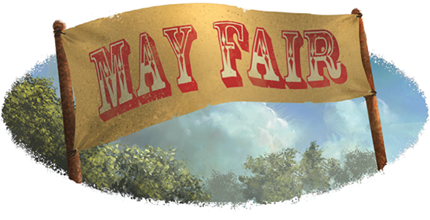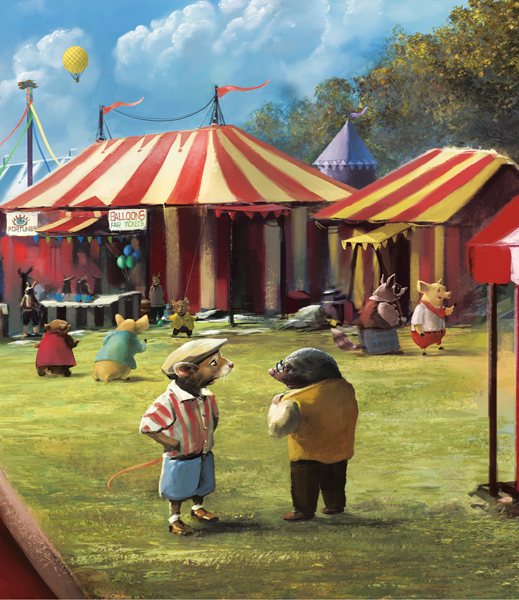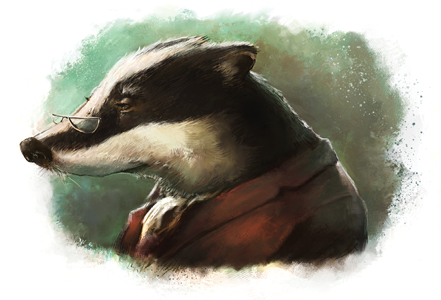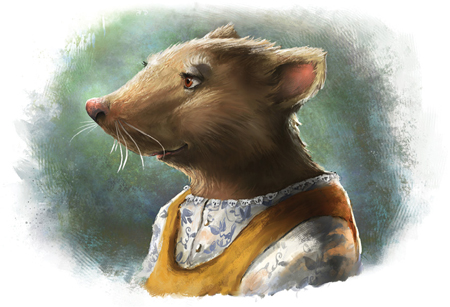
CHAPTER FOUR
The May Fair

In which our heroes celebrate the arrival of summer, and two of them taste grief, although of different flavors.
The frisky Mole trotted along the path to the River, pausing now and then to admire a daisy here and snuffle at a lily of the valley there. He was in the finest mood, for not only was it the day of the May Fair, but the Rat had left his tiny boat at the landing for him so that he could float down to his friend’s house in ease and comfort. (Toad had managed to resurrect his balloon, but Mole had sworn off flight forever, even if it meant never seeing the Ocean.)
“Good old Ratty,” he said. “So considerate of others. Always thinks of his friends, Ratty does. Unlike some other creatures I could think of. Such as toads.”
Now, while it was true that the pleasure of Toad’s company was best appreciated in small doses, no sooner had Mole admitted this to himself than he felt a flush of shame, for he was a thoroughly decent sort and disliked speaking ill of neighbors (even those who might genuinely deserve it). He resolved to look for the best in Toad, who did have—in spite of his essential Toadness—a few endearing qualities.
Mole stepped lightly into the boat and loosed the painter the way Ratty had taught him.6 A moment later, he was on his way.
The Mole looked forward to the day when he might have his own tiny boat cunningly fitted with comfy cushions and gleaming brass appointments. He would name it … he would name it … Mole’s Boat. Oh, dear, how dreadfully unimaginative.7 No, that wouldn’t do at all. A delightful little boat called out for a delightful little name. He mulled this over but could not come up with something suitable. Never mind. The day was too fine to be taxing one’s brain with such matters. The breeze, shuttling merrily back and forth along the banks, set the rushes to singing and the reeds to clacking in joyous counterpoint: The first of May! The first of May! All creatures shall give thanks this day! Before he knew it, he caught sight of the canted willow that marked the Rat’s snug bijou residence under the bank.
“Hullo, Mole!” Rat hailed him from his doorway as Mole secured the boat.
“Hullo, Ratty. What a fine day for the Fair.”
“The finest. Half a mo’— I’m almost ready.” Ratty finished sleeking back his brilliantined fur with a pair of silver brushes. “Right,” he said. “We’re off.”
The pair clambered up the shady bank and emerged into the marshy meadow. In the full sunlight, the Mole’s new waistcoat glowed an alarming orange hue not often seen in Nature. The Water Rat looked startled and then studied his friend’s new togs with a narrowed eye and furrowed brow.
“What is it, Ratty?” asked Mole.
After a moment, the Rat replied, “Oh, nothing. It’s just…”
“Is your tummy paining you? You’ve got that look you get when you’ve been a greedy beggar and eaten too much.”
“It’s just … I say, old chap, are you actually going to wear that waistcoat?”
The Mole looked down at his new apparel. “What, this?” he said, an undertone of hurt creeping into his voice. “Is it too loud, do you think?”
The Rat, a kind and perspicacious animal, heard the dismay in his friend’s voice and hurried to put things right. “No, no, old man, it’s perfectly fine. It’s new, isn’t it? And such a bright, cheerful color. What d’you call it?”
“The tailor called it Canary Mélange,” said Mole, doubtfully.8
“Well, well,” said Rat. “Canary Mélange. So very … natty. So very … festive.”
“The tailor did say it’s the latest thing,” said Mole, gathering his courage.
“Ah. Well. The very latest thing. Sets off your coloring so nicely. Now, come along, old thing. Quick march,” ordered Ratty. “We don’t want to miss out on any of the festivities.”
They set off, the Mole silently berating himself. What a blind mole he was! Why had he allowed the tailor to talk him into Canary Mélange, when a part of him—the sensible part—had known better all along? Why hadn’t he stuck to his usual choice, a sedate gray-and-white check? He fretted like this for a while, but the day was too deliriously fine for him to remain upset for long, and he soon got over himself.
They strolled through the lush water meadow swarming with bejeweled dragonflies; they passed adjoining fields of thrusting green barley and soon came to a well-worn path that ran along the hedgerows. All the small society of the undergrowth—everything that scurried or hopped or fluttered—streamed along the road. Not even the shadow of the Wild Wood looming in the distance could put a crimp in the day, for summer had announced its arrival.
During those moments when the fickle wind turned their way, they could faintly hear the primitive skirling strains of the hurdy-gurdy playing tantalizing snatches of the old songs; songs handed down from animal to animal over untold generations; songs giving thanks for the gifts of a snug burrow, a full larder, a healthy litter, and the return of another summer. They rounded a bend in the path, and there, in the middle of the next meadow, was the Fair in all its glory.
There was a coconut shy, a lucky dip, and a swingboat. There was a squirrel on stilts and a fortune-teller laying out cards, although on closer inspection, it proved to be Mrs. Otter got up in a purple turban and paisley shawl. There were booths with all manner of enticing fripperies and trinkets for the youngsters (for there isn’t a young animal alive who can resist the allure of shiny things). There was sponge cake, shortbread, and jam roly-poly. There were ices of many flavors, and lemonade and barley water and ginger beer, and that most sublime of sticky treats, pink spun sugar. There were delectables aplenty, enough to sicken every small animal there of injudicious appetite.9 In the midst of the hubbub stood the Maypole, a tall, stripped birch trunk dangling long strands of multicolored ribbons, waiting for the dancers to weave their patterns around it.

The whine of the hurdy-gurdy was soon joined by the high sweet tootling of a recorder and the jaunty thumping of a tambourine—chack-a-chack! A company of red squirrels lined up and began the Morris dance, their bright bells all a-jingle and their bold sashes fluttering as they jumped in steps many hundreds of summers old.10 A gaggle of rabbits muttered behind their paws, just loud enough to be overheard—“pretty poor jumping, if you ask me,” “why didn’t they ask us?” “we are the leaping specialists, after all,” et cetera—the way chaps who think they’ve been wrongfully passed over will insist on generally acting like damp squibs and boring the innocent bystander with their grievances.
“Look, Ratty,” remarked the Mole, “there’s old Badger. What a surprise him being here, seeing as he hates going out in Society.”
“For heaven’s sake, Moly, this isn’t Society. Society is all about sitting in a stuffy parlor with dull company, putting on ridiculous airs and droning on about nothing very much, and minding your manners, and balancing your teacup on your knees, and worrying about what others will think of a fellow if he should happen to take the last slice of cake. It’s simply the most tedious bosh imaginable. But the Fair, the Fair is quite a different matter! Why, just look around you. It’s all about celebrating life; it’s about the ripening season, the rising sap. Quite a different matter altogether.”
A family of field mice played crack-the-whip with the youngest mouse at the end, who came loose and rolled to the feet of the Badger. The mouse squeaked in alarm, but Badger merely lifted him by the scruff, swatted the dust from him, and set him on his feet, saying kindly in his common way, “There you are, little fellow. All right?”
“Yes, sir, Mr. Badger, sir,” the mouse quaked. Badger drew tup-pence from his pocket and put it in the youngster’s paw.
“Off you go. And the rest of you mice, you ought to take better care of this little ’un here.”

“Yes, Mr. Badger, sir. We will, Mr. Badger, sir,” stammered the others, and then, terrified to a mouse, pattered away from the terrible gray Badger as fast as their feet would carry them.
“Hullo, you two,” said Badger, espying his friends. “I thought I’d find you here.”
“We’re all here,” replied the Rat. “Even the weasels and stoats have put in an appearance.” A clutch of nervous weasels and stoats, aware that they were there on sufferance, and careful of their manners, doffed their caps and bowed low to Mole, Badger, and the Rat—the three great warriors—who, although they did not condescend to speak to their former adversaries, nodded to them in a nice display of noblesse oblige.11
“But we’re not all here,” said Mole. “Where’s Toad?”
“Probably waiting to make a grand entrance, if I know Toad,” grumped Badger. “And I do know Toad. Rather better than I’d like.”
Sure enough, the words were barely out of Badger’s mouth when Toad’s balloon hove into view and drew an appreciative murmur from the crowd. The captain leaned over the rim of the basket, perhaps a bit too far, and cried out, “Stand back! I’m going to drop anchor!”
This announcement caused a stampede of animals to all points of the compass, quickly producing a clearing of sufficient size to allow for a safe landing.
“Oh, Toad,” cried Mole in alarm, “look out! You’re going to f—”
As if on cue, Toad, the most featherbrained, the most headstrong, the most addlepated of animals, pitched forward over the side and plunged to the ground, landing with an impressively loud, squashy, thump.
“Toad!” cried his friends, appalled, certain that the animal lying motionless on the ground before them (the creature formerly known as Mr. Toad) had shuffled off his mortal coil and was no more. To their great relief, a faint moan issued from the prone form.12
“Uuurk,” groaned Toad.
“He’s alive!” cried the Rat.
“Toad lives!” cried the Mole.
“You stupid bloody Toad!” swore the Badger. The Rat and Mole were too worried about their injured friend to remonstrate with Badger over his shockingly bad language. After all, his provocation was beyond measure.
“Give him air!” cried the Rat to the morbid throng pressing closer for a better look. “He needs air.”
Badger declared, “What he needs is some common sense knocked into him. P’raps this has done the trick. And look, there goes the balloon. Probably for the best.”
“Where am I?” said Toad, slowly sitting up and gathering his wits. “What’s happened?”
Said Rat, “Oh, you nincompoop, you fell out of your aircraft and gave us such a fright.”
“I did?” giggled Toad. “Why, so I did.” To his friends’ relief, he sounded much like his old self. (As you’re probably aware, toads are generally resilient creatures and tend to bounce back rather well.) He sat up in time to watch his escaping balloon drift away.
Mole braced himself for a scene of grief and dismay, but there was none. “Toad,” he said, “what shall we do about your balloon?”
“I s’pose I’ll just have to buy a new one,” declared Toad. “Bit of a bother, but I can afford it. Should I go with the red this time?”
This frivolous attitude was too much for the Rat. He seized Toad by the collar and shouted, “You heedless beast! What if it comes down and hurts someone? They could get the constable on you, and the bailiffs, and I doubt the judge has forgotten your last brush with the law for stealing a motor-car.”
Toad blanched at the memory of his stint in England’s dankest, darkest dungeon, brief though it had been. “Oh, Ratty, what’ll I do?” He thought for a moment and brightened. “I know, I’ll offer a reward for its return. That’ll take care of it.” He turned to the dispersing crowd and cried, “A pound to whoever brings my balloon back to Toad Hall.”13
A whole pound! Toad may as well have uttered words of magic, judging by the effect they had on the crowd. A good dozen of the bystanders hied off in the direction of the disappearing balloon, a sleek hare coursing well out in front, a collection of hedgehogs trundling along mid-pack, and one stolid, deliberate tortoise bringing up the rear.
The friends escorted Toad to the shade of an oak tree and gave him a refreshing glass of ginger beer. After a short rest, he was able to get up and walk about (although his limp was, perhaps, somewhat exaggerated), garnering many solicitous inquiries regarding his physical state. None of this attention did the conceited animal any good at all, being a naturally uppish and inflated sort. The exasperated Badger finally grunted a few short, sharp, well-chosen words, which caused Toad to rapidly deflate, much in the manner of a punctured balloon himself.
They spent a lazy hour rambling about, nibbling on sweetmeats and various dainties, and then the music signaled that it was time for the Maypole dance. Poor Otter, whose thankless job it was to marshal the mob of dancers into some semblance of order, was too busy to speak to his friends and could only wave in their direction in between toots on his whistle and shouts of “You mice, stop that immediately!” and “Voles! Over here, on the double!” The dancers shuffled and chattered and insisted on standing in the wrong place as the members of an excitable throng of animals inevitably do, especially at a fair, and it took Otter a good five minutes to sort them out. Finally, the band struck up the old tune, and off they went, around and around, circling like the wide swirl of water below the weir.
Mole clapped his paws in time, Toad hummed along, and even Badger tapped his foot. But Ratty did none of these things. Instead, he goggled at the dancers, and stared and twitched and shivered as if with ague. His springy whiskers quivered. His fur stood on end. He looked like a rat struck by lightning.
“Ratty,” said Mole, “whatever’s the matter?”
The Rat gurgled something incomprehensible through a mouthful of licorice allsorts. Not the very nicest sight in the world. He pointed a trembling paw in the direction of the Maypole.
“Ratty, speak to me! Badger, help! He’s having a fit of some kind.” The Mole shook his friend roughly, but the Rat merely flopped about, loose-limbed as a marionette. The Mole clapped his paws in the Rat’s face, but he did not blink. The Badger looked at him keenly and thought hard for a moment, then stood behind the transfixed friend and pointed his long, sharp nose in the same direction as the Rat’s, examining the world from the hypnotized animal’s perspective.
“Badger, what on earth are you doing?” said Mole. “Have you both gone mad?”
Badger surveyed the scene and determined that the Water Rat was staring entranced at one of the dancers. She was a stranger from the Meadow Beyond, a pretty, little water rat with twinkling brown eyes, lustrous fur, neat ears, and a delicate muzzle. She caught sight of the Rat, and looked away.
“Oh, dear,” sighed Badger. “It’s no use, Mole—he’s a goner. It’s got him in its grip, I’m afraid, and there’s only one cure for it.”
“Got him?” cried Mole in alarm. “Got him? What’s got him?”
The Badger replied gravely, “It is called Love.”
